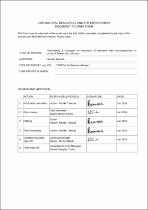 ResearchSpace
ResearchSpace
Developing a prototype for treatment of biowaste with microorganisms to produce biogas and compost
JavaScript is disabled for your browser. Some features of this site may not work without it.
- ResearchSpace
- →
- Research Publications/Outputs
- →
- Conference Publications
- →
- View Item
| dc.contributor.author |
Tawona, Neville

|
|
| dc.contributor.author |
Sithole, Bishop B

|
|
| dc.date.accessioned | 2017-10-10T08:13:08Z | |
| dc.date.available | 2017-10-10T08:13:08Z | |
| dc.date.issued | 2013-10 | |
| dc.identifier.citation | Tawona, N. and Sithole, B.B. 2014. Developing a prototype for treatment of biowaste with microorganisms to produce biogas and compost. | en_US |
| dc.identifier.uri | http://www.tappsa.co.za/pdf/22october_programme.pdf | |
| dc.identifier.uri | http://hdl.handle.net/10204/9648 | |
| dc.description | This is an abstract only. | en_US |
| dc.description.abstract | Waste management in South Africa faces many challenges. The growing population and the expanding economy results in increased volumes of waste being produced, thereby putting a burden on waste management facilities. South Africa is collaborating in an EU sponsored project whose objectives are to convert biowaste into valuable products. The project is part of an initiative that targets to develop environmentally appropriate and socio-economically sustainable biotechnological processes for converting biodegradable fractions of identified African and Mediterranean agricultural and industrial waste as well as fractions of municipal and animal solid waste into food, feed and value-added products. Our contribution is to develop an anaerobic digester to convert solid waste into biogas, and the indigestible component collected for use in the compost facility to produce biofertilizer. This project is based at EThekwini Municipality’s Northdene Research and development centre, which is located within a residential area from which the biowaste is collected. The conversion technology to be developed will rely on simple and locally available equipment and naturally occurring microorganisms. The appropriate prototype will be assessed through selection of proper operating conditions to evaluate the performance of an anaerobic digester and to optimise the anaerobic microorganisms. Determination of the technical potential for the production of biogas from biowaste will be carried out using biochemical methane potential tests. Pilot scale trials will be performed on the selected equipment to produce biogas and compost. The biogas can be used to warm water for the fish project at Northdene during cold weather, and/or it can also be used to heat the reactor to the operating temperature and the compost can be sold as an organic based fertiliser. | en_US |
| dc.language.iso | en | en_US |
| dc.relation.ispartofseries | Worklist;18538 | |
| dc.subject | Biowaste | en_US |
| dc.subject | Biogas | en_US |
| dc.subject | Compost | en_US |
| dc.subject | Microorganisms | en_US |
| dc.title | Developing a prototype for treatment of biowaste with microorganisms to produce biogas and compost | en_US |
| dc.type | Conference Presentation | en_US |
| dc.identifier.apacitation | Tawona, N., & Sithole, B. B. (2013). Developing a prototype for treatment of biowaste with microorganisms to produce biogas and compost. http://hdl.handle.net/10204/9648 | en_ZA |
| dc.identifier.chicagocitation | Tawona, Neville, and Bishop B Sithole. "Developing a prototype for treatment of biowaste with microorganisms to produce biogas and compost." (2013): http://hdl.handle.net/10204/9648 | en_ZA |
| dc.identifier.vancouvercitation | Tawona N, Sithole BB, Developing a prototype for treatment of biowaste with microorganisms to produce biogas and compost; 2013. http://hdl.handle.net/10204/9648 . | en_ZA |
| dc.identifier.ris | TY - Conference Presentation AU - Tawona, Neville AU - Sithole, Bishop B AB - Waste management in South Africa faces many challenges. The growing population and the expanding economy results in increased volumes of waste being produced, thereby putting a burden on waste management facilities. South Africa is collaborating in an EU sponsored project whose objectives are to convert biowaste into valuable products. The project is part of an initiative that targets to develop environmentally appropriate and socio-economically sustainable biotechnological processes for converting biodegradable fractions of identified African and Mediterranean agricultural and industrial waste as well as fractions of municipal and animal solid waste into food, feed and value-added products. Our contribution is to develop an anaerobic digester to convert solid waste into biogas, and the indigestible component collected for use in the compost facility to produce biofertilizer. This project is based at EThekwini Municipality’s Northdene Research and development centre, which is located within a residential area from which the biowaste is collected. The conversion technology to be developed will rely on simple and locally available equipment and naturally occurring microorganisms. The appropriate prototype will be assessed through selection of proper operating conditions to evaluate the performance of an anaerobic digester and to optimise the anaerobic microorganisms. Determination of the technical potential for the production of biogas from biowaste will be carried out using biochemical methane potential tests. Pilot scale trials will be performed on the selected equipment to produce biogas and compost. The biogas can be used to warm water for the fish project at Northdene during cold weather, and/or it can also be used to heat the reactor to the operating temperature and the compost can be sold as an organic based fertiliser. DA - 2013-10 DB - ResearchSpace DP - CSIR KW - Biowaste KW - Biogas KW - Compost KW - Microorganisms LK - https://researchspace.csir.co.za PY - 2013 T1 - Developing a prototype for treatment of biowaste with microorganisms to produce biogas and compost TI - Developing a prototype for treatment of biowaste with microorganisms to produce biogas and compost UR - http://hdl.handle.net/10204/9648 ER - | en_ZA |





